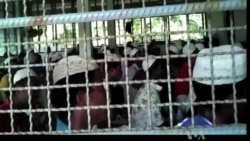HAT YAI, THAILAND —
A six-month deadline for a “temporary stay” in Thailand ends next month for almost 2,000 boat people who claimed to be Rohingya escaping ethnic violence in Burma - as reports surface of mistreatment at Thai immigration detention centers.
Deep in the hills of southern Thailand, local rubber tappers are known to be early risers.
But in recent months, there has been more than just the locals wandering through the plantations, out of sight to most people.
Earlier this year, Thai resident Arun Somphot woke up to a small group of “boat people” sleeping on her front porch.
“When I saw them sleeping there, I was behind this door trying to see who they were. I have my family and relatives who stay in homes nearby. I opened the door and saw many of them sleeping there and I was shocked. They saw me and just got up and sat there. Then I let out a scream," said Arun.
Since January, nearly 2,000 boat people, claiming to be Rohingyas fleeing sectarian violence in Burma have been apprehended and detained by Thai authorities.
Denied citizenship in their own country and desperate to escape persecution, many are vulnerable to exploitation.
Abdul Salaman was held captive in the Thai jungle with a group of fellow Rohingya by traffickers who brought him from Burma. He was released after his relatives in Malaysia paid $1,500 for his freedom.
Now he is in a secure house, cooking meals for hundreds of boat people, detained at several overcrowded immigration centers.
“I was suffering in the past and now that I am free, many of my friends are still facing terrible conditions and lack of food. I do not have any job now so I am cooking meals for them,” he explained.
Despite condemnation from human rights groups after video footage of mistreatment was aired, conditions for the men remain unchanged.
But mounting media reports implicating Thai security in the trafficking of some Rohingya seems to have gotten the attention of top officials.
“I know these are very crowded places. That is why we are going to expand the new center for them to stay. The new area will be more of a waiting camp. We will have a doctor and medical treatment available for them,” said Lt. General Paradorn Pattanatabu of the National Security Council.
As the six-month deadline nears for what was considered a “temporary stay” in Thailand, questions over where the Rohingya will end up still remain.
Deep in the hills of southern Thailand, local rubber tappers are known to be early risers.
But in recent months, there has been more than just the locals wandering through the plantations, out of sight to most people.
Earlier this year, Thai resident Arun Somphot woke up to a small group of “boat people” sleeping on her front porch.
“When I saw them sleeping there, I was behind this door trying to see who they were. I have my family and relatives who stay in homes nearby. I opened the door and saw many of them sleeping there and I was shocked. They saw me and just got up and sat there. Then I let out a scream," said Arun.
Since January, nearly 2,000 boat people, claiming to be Rohingyas fleeing sectarian violence in Burma have been apprehended and detained by Thai authorities.
Denied citizenship in their own country and desperate to escape persecution, many are vulnerable to exploitation.
Abdul Salaman was held captive in the Thai jungle with a group of fellow Rohingya by traffickers who brought him from Burma. He was released after his relatives in Malaysia paid $1,500 for his freedom.
Now he is in a secure house, cooking meals for hundreds of boat people, detained at several overcrowded immigration centers.
“I was suffering in the past and now that I am free, many of my friends are still facing terrible conditions and lack of food. I do not have any job now so I am cooking meals for them,” he explained.
Despite condemnation from human rights groups after video footage of mistreatment was aired, conditions for the men remain unchanged.
But mounting media reports implicating Thai security in the trafficking of some Rohingya seems to have gotten the attention of top officials.
“I know these are very crowded places. That is why we are going to expand the new center for them to stay. The new area will be more of a waiting camp. We will have a doctor and medical treatment available for them,” said Lt. General Paradorn Pattanatabu of the National Security Council.
As the six-month deadline nears for what was considered a “temporary stay” in Thailand, questions over where the Rohingya will end up still remain.





